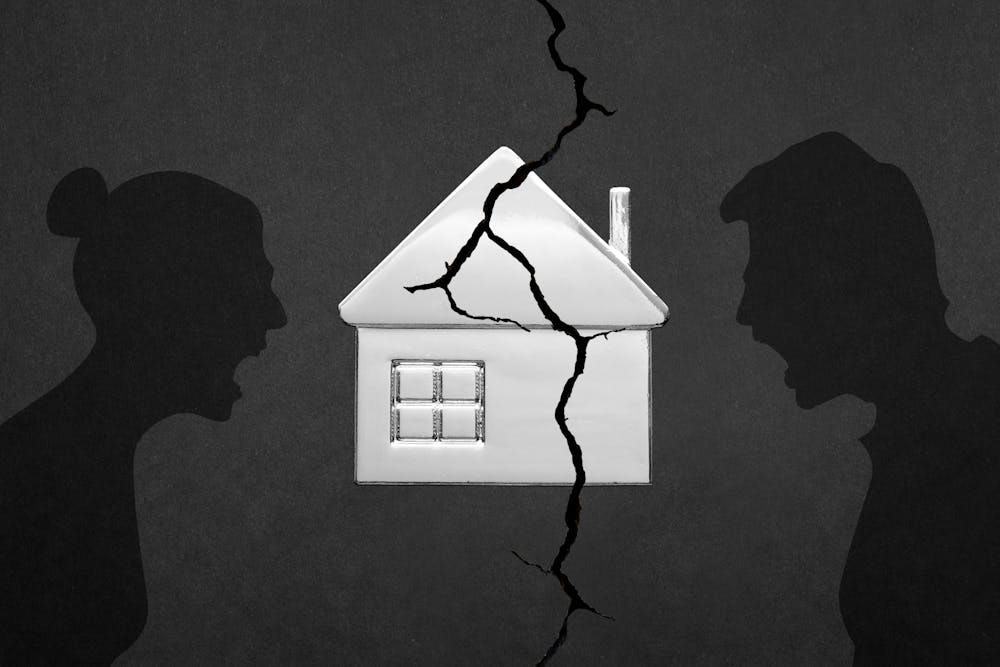"*" indicates required fields
North Carolina Divorce Lawyers
Key Takeaways
- Divorce proceedings are an emotional and difficult process, usually involving complex legal issues.
- Navigating North Carolina’s divorce process can be difficult and stressful, and it can be challenging to make the right decisions while under duress.
- North Carolina divorce can only be filed on a no-fault basis.
- Fathers usually feel at a disadvantage during a divorce due to societal norms rather than the gender-neutral rulings of the court.
- Working with an experienced North Carolina family law firm that understands the challenges people face can be beneficial toward protecting your rights and receiving fair outcomes on family court orders.
Divorce in North Carolina encompasses a range of complex legal and emotional issues. The process of ending a marriage involves navigating a series of challenges, including legal procedures, financial considerations, and arrangements regarding child custody.
Concerns about safeguarding personal rights and financial assets, as well as securing child custody arrangements, can significantly increase the stress of the situation. Without clear guidance, you may face extended legal battles, rising costs, and greater emotional distress for yourself and your children during the divorce process.
In this context, a knowledgeable North Carolina divorce attorney can help. The attorneys at Cordell & Cordell are experienced in all aspects of North Carolina family law. We can provide essential legal guidance and support, helping you navigate the process more effectively.
By fighting to achieve fair and equitable outcomes, our family lawyers aim to protect our clients’ interests during the legal processes of divorce and facilitate a smoother transition to post-divorce life.
Components of Divorce in North Carolina
North Carolina only allows no-fault divorces.
According to state law: “Unlike some other states, North Carolina only allows for no-fault divorce, which requires at least one year of separation.” This separation does not need to be a formal legal separation, the couple only needs to live apart for a period of one year.
What if My Spouse Doesn’t Want a Divorce?

Even if your wife does not want a divorce, she cannot stop you from pursuing a divorce in North Carolina. A divorce claim is filed separately from other divorce issues and is typically the easiest issue in a divorce to resolve. Your biggest hurdle will be waiting the separation period of one year.
Your wife can, however, dispute the terms of the other issues at stake — such as custody, child support, alimony, and property division. These can be resolved though a separation agreement, consent order, or by going to trial where a judge will tender a decision on these issues. Items you and your spouse may need to resolve are usually issues connected to:
- Child custody
- Child visitation
- Child support
- Spousal support
- Division of assets
- Other applicable issues
If divorce-related disagreements occur in a North Carolina divorce, the process typically looks like this:
- File a complaint
- Serve your spouse with the summons and complaint
- Wait for the spouse to respond
- Discovery
- Schedule pre-trial motions and hearings
- Engage in settlement negotiations (and/or mediation)
- Attend trial and receive judgment
- File post-trial motions and appeals, if necessary
In a trial divorce scenario, a judge will make their final ruling based on evidence provided in court.
Understand a Father’s Rights in a North Carolina Divorce
During the divorce process, fathers usually feel at a disadvantage due to societal norms. While North Carolina courts are designed to be gender-neutral, and in most cases, women aren’t automatically favored, men still often encounter biases.
The consequences of bias lead to years of financial harm or time lost with your children, causing damage to your relationship. Working with a strong North Carolina divorce lawyer who knows how to champion men’s rights can help you protect your relationships and financial interests.
Can Men Receive Alimony?
Alimony is not gender-specific under North Carolina law. Today, courts tend to refer to alimony as “spousal support.” Either spouse may be awarded spousal support, or the court may decide that spousal support is unwarranted.
A judge will consider several factors when tendering this decision, but gender isn’t one of them. Factors judges evaluate include:
- One spouse’s financial dependence on the other
- Whether one spouse earns income that meets financial needs
- If one spouse doesn’t have the earning potential to meet financial needs
- Length of the marriage
- If one spouse has unequal earning potential (e.g., they were a stay-at-home parent while the other worked, missing out on career opportunities)
- Marital misconduct
- Any other relevant factors
Supporting spouses must have given financial support throughout the marriage and currently have the financial ability to meet their financial needs as well as their spouse’s financial needs for a judge to order spousal support.
Which Parent Usually Receives Custody of the Child?
Neither the mother nor father receives preferential treatment in a North Carolina court when custody is being decided. A judge will evaluate all the information provided and rule in favor of the best interests of the child. Factors the judge will use include but are not limited to:
- Which parent has been the primary caregiver
- Each parent’s ability to spend time with the child
- Each parent’s ability to care for the child
- Work schedules
- Home environment
- Emotional and physical health of each parent
- Child’s preference
- Whether there is a history of domestic violence from a parent
- Drug or alcohol use by a parent
- Whether a history of child neglect or harm is evident
This is not a comprehensive list but is a good indicator of factors a judge will weigh when ruling on a child custody case.
What Happens If the Father’s Name is Not on the Birth Certificate During a Divorce?
It is likely a father will not have rights or obligations to a child if not listed on the child’s birth certificate during a divorce. To rectify this, the father will need to get a paternity test.
Dividing Marital Assets

North Carolina’s property division law splits marital property based on equitable distribution. The state has categorized three types of property.
Marital Property
- Divided based on equitable distribution
- Property acquired by one of the parties during the marriage and currently owned
- Debts created during the marriage
- Vested pension and retirement benefits (between wedding date and separation date)
- Gifts given during the marriage, unless the donor said at the time of the gifting it is intended to be separate property
Separate Property
- Not subject to division
- Property owned by either spouse prior to the marriage
- Property obtained by one spouse through inheritance or gift from a third party
- Property acquired after a couple separates
- Income derived from a separate party
Divisible Property
- Property obtained between separation and divorce
- May be divided based on circumstances
Why Work With Cordell & Cordell
Cordell & Cordell was founded in 1990 as a law firm committed to representing men to act as their advisors and advocates in protecting their family and financial interests. Throughout our years of experience, we’ve seen firsthand the biases men experience in matters of custody and domestic matters. We’re here for you to provide legal advice and support in all family law issues. The attorney-client relationship is very important to our law firm. You matter to us!
Clients choose to work with the legal professionals at Cordell & Cordell because they know they’ll have a strong advocate to represent and champion their rights both inside and outside a courtroom. Our experienced divorce attorneys are not afraid to take a case to court — and we’ll aggressively fight for what’s right as we provide legal services to you.
Client Experiences
“Everything from Josiah was dead on. He was an excellent communicator, he did not beat around the bush, and was always very straightforward. He was very professional and goal-oriented and was going to do everything he could to reach a resolution, and that is what he did. I was very pleased with Josiah.” — Scott C.
“Communication was really, really, really, good. I appreciated how I was kept informed throughout. They were always checking in on me to see if I had any questions or needed anything. Everything was great.” – Benjamin C.
“I thought the whole experience was very good. I wasn’t going to initially hire an attorney. To protect myself I hired you guys. Cassie made it a comfortable experience. The whole team was great. We got a resolution that I was comfortable with and it went quickly and smoothly.” – Joseph C.
In Need of a Divorce? Contact Us.
North Carolina divorce cases are difficult, and if you are facing the probability of a divorce, you will want skilled legal counsel to advocate for you. The experienced divorce law attorneys at Cordell & Cordell have a long history of being the champions of husbands and fathers in all family court practice areas.
We believe you should have equal rights, and we will work hard to see you are treated fairly in your divorce settlement, child custody case, child support case, visitation case, or other family law matters. To schedule a consultation with the compassionate North Carolina family law attorneys at Cordell & Cordell, call 866-DADS-LAW (323-7529) or fill out our online contact form.
Frequently Asked Questions
The State of North Carolina requires you and your spouse to have a separation period of one year, and one partner has to be residing in North Carolina for six months before becoming eligible to file for divorce.
Dissipated assets are marital assets that have been intentionally wasted. If you believe your partner is dissipating your assets, call an experienced family law attorney right away.
If your separation agreement was a contract, if your spouse violates it, you can sue them in court. If the separation agreement was a part of a court order, then the court could hold them in contempt.

Written by Joseph E. Cordell

Joseph E. Cordell is the Principal Partner at Cordell and Cordell, P.C., which he founded in 1990 with his wife, Yvonne. Over the past 25 years, the firm has grown to include more than 100 offices in 30 states, as well as internationally in the United Kingdom. Mr. Cordell is licensed to practice in the states of Illinois and Missouri and received his LL.M. from Washington University in St. Louis, Missouri. Joseph E. Cordell was named one of the Top 10 Best Family Law Attorneys for Client Satisfaction in Missouri.

North Carolina Resource Articles






